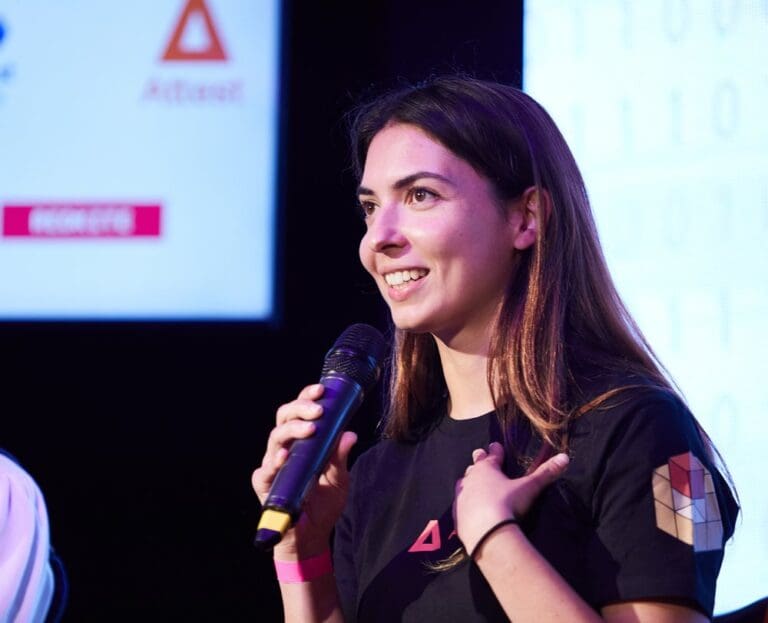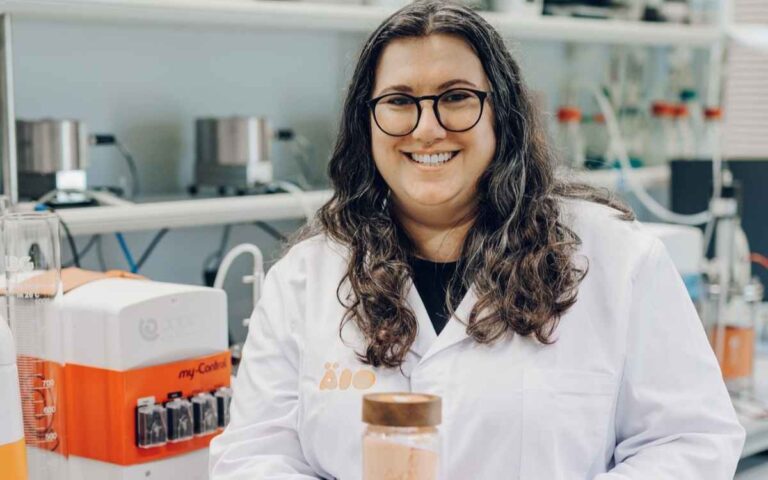Eugenia started at Attest fresh out of a conversion masters and has quickly ramped up her skills over the last four years, moving from a backend engineer position to a technical lead position, and finally to a technical engineering manager position. Meet Women Leading in Tech and discover Diverse Journeys in Cybersecurity and Incredible Female Role Models in Tech like Eugenia, whose journey exemplifies growth and leadership in the tech industry.
YOU’VE BEEN AT ATTEST TECHNOLOGIES FOR FOUR YEARS NOW. TELL US A LITTLE ABOUT YOUR TIME AT THE COMPANY.
I joined Attest almost four years ago, fresh out of a conversion MSc in computer science. While I had some exposure to programming concepts, I didn’t have extensive commercial programming experience beyond a three-month internship I had completed the summer before the MSc. This journey has been a learning curve, filled with many opportunities to make mistakes and grow, inspired by Incredible Female Role Models in Tech who paved the way.
I was able to quickly ramp up my experience thanks to strong support from other engineers in the team. I went from never having programmed in Java or Go, to switching between writing features in both languages and deploying multiple changes a day.
As time went on, I went from being overwhelmed by the sheer size of the codebase, to independently making iterative improvements, to writing proposals that fundamentally improved the codebase.
In parallel to my personal programming journey, Attest was also evolving as a company – growing from the 35-person start-up I joined, to a 150-person scale-up operating across the UK and US. Growth at a high-performing start-up entails a lot of change. Embracing this change exposed me to leadership opportunities very early on, at a timescale that would have taken many more years at a larger company.
I was strongly encouraged to take on more delivery and leadership responsibilities, which led to a promotion to tech lead in 2020. My role became a lot more focused on the strategy and delivery of the team, and on unblocking others as much as possible.
I became a technical engineering manager at the end of 2021, which came with a change in remit. I am now responsible for the delivery of the team, as well as the growth of the engineers in the team.
HOW HAS ATTEST CONTINUED TO SUPPORT YOUR CAREER DEVELOPMENT OVER THIS TIME?
I was set up to succeed from the first day I joined Attest. I was well-supported within my team, with a strong backend engineer showing me best practices and pushing me to take on tasks that were incrementally more ambiguous. I’ve always had the opportunity to keep upskilling through Attest’s growth and development budget. Our career progression framework has been a transparent way to understand where my skills are, and where I need to spend time growing to reach the next level.
Informally, it’s been nice to attend tech meetups with others from Attest, as sometimes it’s a bit daunting to go completely alone. London Gophers is a favourite, and I now co-host the London Microservices event with another Staff Engineer from Attest!
IS THERE A PROJECT YOU HAVE WORKED ON THAT YOU ARE MOST PROUD OF? WHAT DID YOU ACHIEVE?
Leading the implementation of a couple of features mid-pandemic was a key moment of growth for me. At first, I thought that my role meant that I had to “do it all” – technical discovery, scoping, and leading the implementation. I couldn’t have been more wrong! One of the engineers who coached me during this time showed me that it was most important to “set the tracks correctly, so others can drive the train” – meaning, the most important part of my job was to set the direction but to empower others to drive it forward.
Using lightweight proposals and sharing these out early often produced better results than designing everything up front and then needing to pivot to incorporate feedback into the design. Empowering every engineer to write a subset of the tickets worked much better than expecting one engineer, or the product manager, to write them all. Hindsight is always easier and more obvious, but it was clear that trusting others to implement the trickiest parts of the feature and instead focusing on the overall delivery of the feature led to much better results, and an overall happier team, versus trying to do everything myself.
WHAT ARE YOUR PLANS/GOALS FOR THE NEXT FOUR YEARS?
I’m in the interesting position of being a technical engineering manager. This means that although the bulk of my responsibilities lie in ensuring engineers are well supported to grow and thrive at Attest, I also have some delivery responsibilities. My plan in the medium term is to continue to refine the balance between the two.
WHAT FIRST SPARKED YOUR INTEREST IN WORKING IN THE TECH INDUSTRY?
The ability to build something which automated the repeated parts of work kick-started my interest in tech. Automating the boring stuff, I reasoned, would generate even more value by freeing up this time to focus on things that humans are uniquely placed to do, and which feel most rewarding – like inferring meaning from results, or writing research papers.
I vividly remember working in policy research and being confronted with how getting data for research was particularly time intensive and repetitive. Over two summers whilst I finished my undergraduate degree, my job was to scan over a report spanning thousands of pages, extracting text from paragraphs, and manually encoding the information into a spreadsheet. Throughout this repetitive task, I would try to break down each part of the text extraction into an instruction – for example, first, find the age and gender data points, then add the summary, then the geographical location. I realised that I was essentially trying to build a text extraction program – but didn’t have the technical ability to do so.
This frustration pushed me to learn to code – first, by going through online tutorials (through websites like FreeCodeCamp and Codecademy). Once I validated that my interest in tech was not fleeting and that I enjoyed putting in the hard work to further my technical skills, I decided to make a career switch and work in the tech industry.
I enrolled in Makers Academy, an intensive three-month bootcamp. The bootcamp exposed me to agile methodologies, alongside other skills such as test-driven development and source control, which I would need to succeed commercially. I then worked for 3 months as a software intern, where I was able to test-drive working in the tech industry.
Finally, I enrolled in a conversion MSc in Computing at Imperial College (which was extremely intense), which enabled me to learn the fundamentals of computing, and validated that my preferred area of focus was back-end engineering.
IS THERE ANY ADVICE YOU WOULD GIVE WOMEN IN TECH CONSIDERING A CAREER IN ENGINEERING THAT YOU WISH SOMEONE HAD TOLD YOU?
Keep track of your achievements – what did you do, with what technologies, and what was the impact? It’s easy for bias to kick in, and to only be aware of the most recent thing you’ve worked on. When you contextualise your latest contribution in terms of how it builds on top of all your previously delivered work, you have a much more comprehensive way of understanding where you’re improving, and where you might need to grow.
Be aware of glue work. Glue work is non-promotable work, like being the de-facto documentation writer and meeting minutes note-taker. Although the key to the smooth delivery of a project, it does not build your hard technical skills up. This is not to say you should never do glue work, you should just be aware that women are 48% more likely to volunteer for these non-promotable tasks. Especially when you’re starting out in your career and need to build out your technical skills in order to progress, make sure you’re not the one who always does the glue work in the team.
DISCOVER MORE ABOUT A CAREER WITH ATTEST








